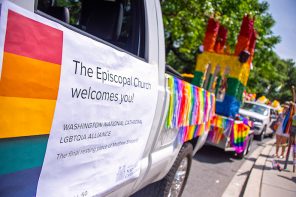As the Episcopal Church begins its General Convention in Anaheim, California, many are waiting for the besieged denomination to begin anew conversations around gay bishops and other matters of sexuality as the march toward marriage equality continues to heat up [see comic below this post].
But, right out of the box, Episcopal Presiding Bishop Katharine Jefferts Schori is showing she’s able to create shockwaves of her own. In her opening statement to the General Convention, Rev. Schori took a shot one at of the sacred cows of many Protestant believers—individual salvation:
The overarching connection in all of these crises has to do with the great Western heresy—that we can be saved as individuals, that any of us alone can be in right relationship with God. It’s caricatured in some quarters by insisting that salvation depends on reciting a specific verbal formula about Jesus. That individualist focus is a form of idolatry, for it puts me and my words in the place that only God can occupy, at the center of existence, as the ground of being. That heresy is one reason for the theme of this Convention.
The crises Rev. Schori refers to are more far reaching than the church’s own battles over gay bishops and acceptance of gays and lesbians in the pew. She looks even deeper into the problems of the human race and names the sin of rampant individualism as the cause of most of the world’s problems, from environmental disasters to economic meltdown.
I said that this crisis has several elements related to that heretical and individualistic understanding. We’ve touched on one—how we keep this earth, meant to be a gift to all God’s creatures. The financial condition of the nations right now is another element. The sins of a few have wreaked havoc with the lives of many, as greed and dishonesty have destroyed livelihoods, educational possibilities, care for the aged, and multiple forms of creativity—and that’s just the aftermath of Ponzi schemes for which a handful will go to jail. If we want to be faithful, we need to be continually rediscovering that my needs are not the only significant ones. […] We are our siblings’ knowers and their keepers, and we cannot be known without them—we have no meaning, no true existence in isolation. We shall indeed die as we forget or ignore that reality.
The speech has already raised eyebrows at more conservative Christian news sites like the Christian Post and One News Now that fretted over her dismissal of “the sinner’s prayer of repentance.” The accompanying “poll” (I hesitate to use poll in an unqualified way since the poll is so obviously one-sided in its available responses) brand Rev. Schori the true heretic.
I give Rev. Schori high marks for the direction of her speech. As one raised in the Southern Baptist church I was taught that individual salvation was like cleanliness—it was as close to godliness as we could get. If we “get right with God” in our hearts and minds, then that’s really all that is required for salvation and righteousness. As I’ve progressed in age, I’ve come to see what kind of havoc that can wreak on a society. Those who believe “once saved, always saved” have too often been the purveyors of much evil in the world. They’ve got their salvation and nothing can take it away, so they think nothing of cheating, stealing, lying, or even killing—sometimes in the name of their savior.
Rev. Schori’s amazing opening words to her flock call us from this insidious practice and rightly names it for what it is—heresy and idolatry. Focusing only on our own needs—with perhaps scraps and crumbs thrown to “the least of these”—has produced a selfish church preaching a variety of individualistic messages of prosperity, moral superiority, or feel-good sermons about godly self-esteem.
I hope not just the Episcopal Church, with all its problems, but every church will hear and heed Rev. Schori’s brave words—we are each other’s keepers and if we forget that, it will surely be the demise of us all.
From Integrity USA, in partnership with Douglas Gould and Co., comes this comic, “The Ripple,” connecting the history of the Episcopal Church with the struggle for LGBT equality:




